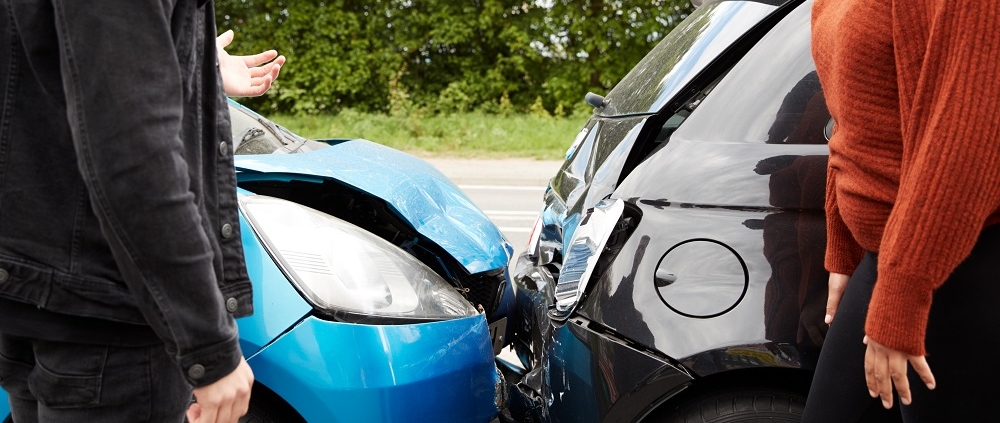The moments after a car accident are scary. You may be injured, disoriented, and confused about what steps to take — especially if the car accident wasn’t your fault.
We hope that you never find yourself in this situation, but we also want you to be prepared if you do.
Knowing what to do after a car accident that’s not your fault can help you keep calm, stay safe, and perform the due diligence needed to get the healthcare treatment and legal justice you deserve. It can protect you, your passengers, and your rights.
Here’s what to do after a car accident that’s not your fault.
#1) Check yourself for injuries.
The first priority after a car accident is to check yourself for injuries. Take a deep breath, and do a body scan to see where you may have been injured. Note that adrenaline may kick in after a car accident, and it’s possible that you could have injuries that you don’t immediately notice. Scan your body, and if you have a severe injury, wait in the vehicle and call for help.
#2) Check your passengers for injuries.
Next, check any passengers in your car. Give them directions to scan their bodies, reminding them that they may not feel certain injuries as their bodies react to the shock of the car accident. If a passenger has an injury, call for help and offer aid.
#3) Assess your surroundings and move to safety — if possible.
If you and your passengers are in stable condition, your next action should be assessing your situation and deciding if you can and should move to safety.
If you were in a car accident that wasn’t your fault, you may think you should leave the vehicle as is so you can gather evidence about the accident. But, if the vehicle is in a position that is dangerous and is in condition to be moved, move it to safety.
If the vehicle can’t be moved, take a moment to assess your surroundings before leaving the vehicle. Check for traffic or hazards outside before exiting.
#4) Check on others, and call 911.
Once safe, check on the drivers and passengers of other involved vehicles, and call 911 for help. Depending on the severity of the accident, you may need police and/or emergency care services. Report the accident, and provide as much detail as possible to help emergency teams assess your needs.
#5) Gather information.
If you were in a car accident that wasn’t your fault, it’s important to collect as much information as possible. The more details you have, the better your case will be if insurance companies fight, deny, or downplay your claims.
Collect:
- Names and contact information of involved drivers
- Insurance information for involved drivers
- License plate information and make, model, and color of involved vehicles
- Names and contact information of other passengers
- Names and contact information of any witnesses
- Name and badge number of police officers (ask them when and where you can get the police report)
- Location and time of the accident
- Dashcam footage, if available
Use your phone to take photos of all involved vehicles, and capture close-up photos of damages (inside and outside of vehicles). Also, consider writing down any notes about what happened leading up to the accident while your memory is still fresh.
#6) Seek medical care.
You may feel fine after an auto accident, but you may not fully feel the effects of the accident for a few hours or even a few days.
Be proactive, and seek medical care to ensure that you don’t have any issues that need immediate assistance. Plus, a medical report can help you in the event that you have injuries caused by an accident that wasn’t your fault. It can be useful in proving damages.
#7) Get legal help.
If you’re in an auto accident that wasn’t your fault, the at-fault driver’s insurance company is responsible for damages. But, it may not be as simple as filing a claim to get what’s due to you.
To make sure you go through the claims process properly and get full compensation for damages, talk to a personal injury attorney with experience in auto accidents. An attorney can guide you through the process and make sure you get what’s due to you.
If the accident wasn’t your fault, you may be entitled to more than just damages for your vehicle and immediate medical treatment. You might be entitled to costs related to:
- Long-term physical therapy or treatment
- Mental health treatment
- Lost wages
- Lost funds (for example, the cost of canceling a vacation due to the accident)
- Long-term pain and suffering
An experienced auto accident attorney can make sure you get what you need to become whole — physically, emotionally, and financially — after a stressful car accident.
Have you been in a car accident that wasn’t your fault?
If you don’t know what to do after a car accident that wasn’t your fault, we’re here to help.
All consultations at TJ Grimaldi are free. We’re here to listen to your story and tell you how we can help you get what’s due to you. Request your free consultation or call 813-226-1023, and talk to me personally about how my team can help you fully recover after a car accident.




Leave a Reply
Want to join the discussion?Feel free to contribute!